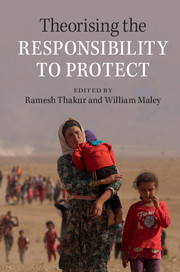Book contents
- Frontmatter
- Contents
- List of figures
- Notes on contributors
- Part I Context
- Part II The Responsibility to Protect, normative theory and global governance
- 5 The Responsibility to Protect and world order
- 6 International law and the Responsibility to Protect
- 7 The Responsibility to Protect, multilateralism and international legitimacy
- 8 Global governance and the Responsibility to Protect
- 9 International law, the Responsibility to Protect and international crises
- 10 The Responsibility to Protect and the just war tradition
- 11 War is not the answer: the Responsibility to Protect and military intervention
- Part III The Responsibility to Protect and international social purposes
- Index
7 - The Responsibility to Protect, multilateralism and international legitimacy
from Part II - The Responsibility to Protect, normative theory and global governance
Published online by Cambridge University Press: 05 August 2015
- Frontmatter
- Contents
- List of figures
- Notes on contributors
- Part I Context
- Part II The Responsibility to Protect, normative theory and global governance
- 5 The Responsibility to Protect and world order
- 6 International law and the Responsibility to Protect
- 7 The Responsibility to Protect, multilateralism and international legitimacy
- 8 Global governance and the Responsibility to Protect
- 9 International law, the Responsibility to Protect and international crises
- 10 The Responsibility to Protect and the just war tradition
- 11 War is not the answer: the Responsibility to Protect and military intervention
- Part III The Responsibility to Protect and international social purposes
- Index
Summary
The principle of the Responsibility to Protect (R2P) has won broad support around a clear definition that is relevant to a narrow and specific range of atrocities: genocide, war crimes, ethnic cleansing and crimes against humanity. Controversies remain, especially in how R2P is operationalised and implemented, and in terms of international action when governments are unwilling or unable to prevent or stop atrocities. Where there is less controversy is in the legal and political distinction between coercive international action for human protection purposes which is authorised through multilateral organisations such as the UN, and that which is undertaken unilaterally or by groups of states acting without UN authorisation. Multilateral action on R2P – whether to promote a general doctrine in support of human protection norms or to respond to specific humanitarian crises – is inherently legitimate because it is conducted through established multilateral channels, the most important of which is the UN. R2P is therefore anchored to a Westphalian, pluralist conception of international society and existing norms of world order.
In line with this, the most important progress in the protection agenda is that which has occurred in or through multilateral settings, such as the 2005 World Summit Outcome's endorsement of R2P, United Nations Security Council resolutions on the protection of civilians in armed conflict, the appointment of UN advisers on genocide and on R2P and thematic General Assembly debates on R2P, among other examples. The procedural legitimacy of multilateral decisions and processes is generally assumed, and from the liberal perspective this is an expression of popular will. Even when scholars challenge the ethical distinction between coercive humanitarian action undertaken through multilateral organisations such as the UN and action undertaken without UN approval, they generally do not challenge the legitimacy of the UN when that organisation does take action. Moreover, despite the limitations and problems associated with the multilateral implementation of R2P – especially in responding to atrocities – most UN member states would be steadfastly against any coercive action for humanitarian purposes outside the UN framework, irrespective of arguments about effectiveness. Safeguards against the misuse of force for ‘humanitarian’ purposes – and concerns over the proportionality of and accountability for international action – therefore appear to transcend human solidarism, at least in policy circles.
- Type
- Chapter
- Information
- Theorising the Responsibility to Protect , pp. 125 - 143Publisher: Cambridge University PressPrint publication year: 2015
- 1
- Cited by



